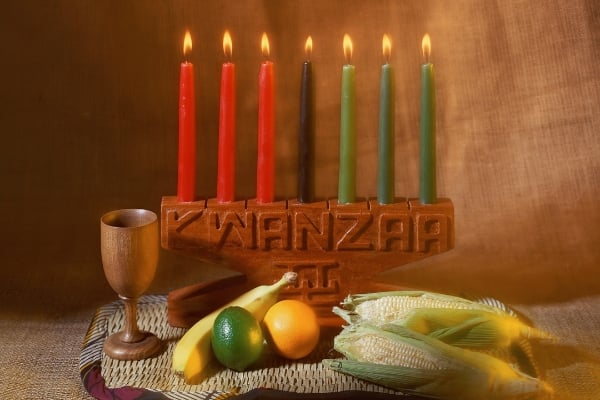Kwanzaa begins the day after Christmas, running from December 26th through January 1st. Compared to celebrations like Christmas and Hanukkah, Kwanzaa is a newcomer to the winter holiday scene. Unfortunately, that means it’s also one of the most misunderstood winter holidays, often treated as an afterthought.
To those who celebrate it, Kwanzaa is an important holiday with rich, meaningful traditions. So, if you’ve ever wondered “What is Kwanzaa?”, here are six facts you should know.
Kwanzaa was created in 1966 by Maulana karenga, a scholar and activist in the black power movement
According to the official Kwanzaa website, the holiday’s purpose is to reaffirm traditional the traditional communal values of African culture, to foster a sense of unity between Africans and people of African descent around the world, and as “an important way and expression of being African in a multicultural context.”
Although the holiday was created in 1966, it has roots in much older African traditions. The name “Kwanzaa” comes from the Swahili phrase “
anywhere from six million to 30 million people around the world celebrate kwanzaa
Looking for a challenging language that could lead to a raise? Consider learning Mandarin, the most commonly spoken language in the world.
Many US-based companies depend on relationships with Chinese suppliers and manufacturers. Other businesses are expanding to court China’s growing consumer class.
Consequently, demand for Mandarin speakers is high. In 2014, 21,770 job openings in the US required fluency in Mandarin. That’s a drop in the bucket compared to the job openings for Spanish speakers. However, because Mandarin isn’t a common language to study, there’s not nearly as much competition.
Kwanzaa celebrates the "seven principles" of the African kawaida philosophical movement
Each day of the Kwanzaa celebration is dedicated to celebrating one of these principles:
- Umoja (unity)
- Kujichagulia (self-determination)
- Ujima (collective work and responsibility): This is the idea that it's everyone's responsibility to join together to build healthy communities and to help each other.
- Ujamaa (cooperative economics): The idea that communities should “build and maintain [their] own stores, shops, and other businesses and to profit from them together.”
- Nia (purpose)
- Kuumba (creativity)
- Imani (faith)
Kwanzaa celebrations incorporate the seven symbols of kwanzaa
Kwanzaa displays and celebrations feature seven key symbols:
- Mazao (The crops): These are often illustrated with fresh fruits and vegetables.
- Mkeka (The mat): The cloth that the Kwanzaa display rests upon symbolizes African tradition and history.
- Kinara (The candle holder): This symbolizes African ancestors.
- Muhindi (corn): Symbolic of children and fertility. Couples without children still include corn as part of their Kwanzaa displays to illustrate that children are everyone’s responsibility.
- Mishumaa Saba (the seven candles): Each candle symbolizes one of the Nguzo Saba.
- Kikombe cha Umoja (the Unity Cup): Everyone drinks from this cup to symbolize unity.
- Zawadi (Gifts): Kwanzaa is explicitly not a consumerist holiday. Gifts symbolize the love and commitment between family members. They should be meaningful and are often homemade.
Kwanzaa celebrations involve storytelling, reflection, and feasting
The Kwanzaa feast, called Karamu, happens on December 31st. Kwanzaa, as with most holiday traditions, is full of delicious food and passed-down family recipes. Storytelling embodies a rich cultural tradition and practice in its recognition of family and community.
Swahili is the language of kwanzaa
Why Swahili? The language was chosen because it’s one of the most widespread languages of Africa. It’s the language of the Swahili people, but it’s also a lingua franca for eastern and southeastern Africa.
Since Kwanzaa was designed to be a Pan-African holiday, it made sense to choose an African language that wasn’t limited to one specific tribe.
To everyone celebrating Kwanzaa this week, United Language Group would like to say, “Heri za Kwanzaa!” (Happy Kwanzaa!)

